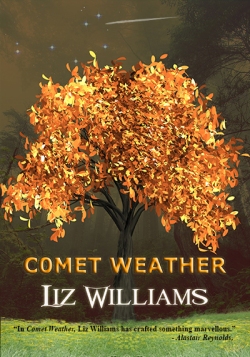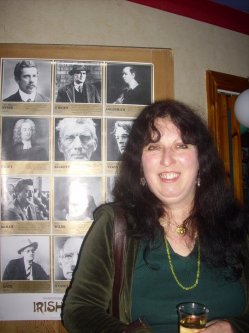 Milford: First of all, Liz, could you please give us a very quick introduction to Comet Weather.
Milford: First of all, Liz, could you please give us a very quick introduction to Comet Weather.
Liz: It’s the only novel I’ve ever written which is set in contemporary Britain. It’s set partly in Somerset, where I live, and in London and Wiltshire. The plan, however, is to write 4 novels, all of which are set in the Southern counties of England. Although I come from a Welsh and Scots background, I feel that a lot of Celtic mythology has been mined to death and there is so much folklore and myth in Southern England – in the West Country, and counties such as Hampshire and Dorset, that it would be interesting to explore it.
Milford: In the last two decades you’ve had fourteen or so novels published, as well as a couple of novellas, short stories and short story collections encompassing both science fiction and fantasy, but this one seems to be the closest to home. A lot of Comet Weather is set in Somerset, where you live. How much did you draw on the local area?
Liz: I think it’s actually about 20 novels. As above, I draw on the local area a lot, but I’m not drawing too much on Glastonbury, which is ironically where I actually live. Again, I think it’s been overdone and some of the mythology that surrounds it has become hackneyed by repetition, so I’m focusing on other magical and folklore elements.
Milford: A multi-person rotating viewpoint story is technically difficult to pull off, how did you go about it?
Liz: so this novel was written in a completely insane way – it took 10 years to write about half of it, and then the final half was written in 5 weeks. This is because it was my ‘treat’ project, the thing I wrote to have fun (I have done other stuff over those 10 years, obviously). But I didn’t have much time, so I wrote it in short sections and that naturally fitted the different viewpoints.
Milford: How many of the supernatural elements did you pull out of actual folklore, and how much is pure imagination?
Liz: most of it is based in actual magical practice, but it’s over quite a long span of time so there are elements which are familiar to me and other occultists, but probably not to the general public. However, I always put a spin on things and play around with them: I am a bit ruthless when it comes to myth and magic, and I will change things.
Milford: What are the Behenian Stars and where did you get the inspiration for them?
Liz: The Behenian stars seem to be little known today, although they were a major part of Renaissance astrology. The names derives from the Arabic ‘ bahman,’ or root, as there was supposed to be a relationship between these stars and the planets themselves: each planet takes its power from the corresponding star. I have also seen a suggestion that the name comes from the herb Centaurea behen, or saw-leafed centaury, which was known as the ‘beekeeper’s herb’ – the dome of stars, drawn from above, resembling the bees in the hive. They have a personified spirit attached to them but this can sometimes take male form: I tinkered about with that.
Milford: The main characters are all female, with male characters in a supporting role. What can you say about the feminist elements in the book?
Liz: I wanted the women to be the ones who have the adventures and the men to be supportive: that’s quite deliberate. Some of the boyfriends aren’t, obviously, particularly supportive as that’s part of the plot, but I wanted the men to take a backseat in this. So often in fantasy the women end up shoring up the male characters and I get bored with that: even when some female characters start out as strong, independent etc, the romance gradually becomes centre stage and I don’t want that to happen. Stella, for instance, may or may not end up with anyone (male or female): she’s doing other stuff.
And I didn’t want the women in this to be the kind of female characters who have become stereotyped in fantasy: they’re not all kick ass, ‘feisty’ women. I don’t, personally, do any martial arts, I’m not necessarily into carrying a weapon, but I don’t take much crap either. There are lots of ways of being female in this world and I wanted to reflect a range of those, rather than squeezing the women into the ‘one size fits all.’ I think fantasy has become increasingly restrictive when it comes to portraying women and I find a lot of it very boring.
Milford: Two of the supporting characters who stand out are the Fallow sisters’ grandfather, and the rather wonderful Dark, two very different ghostly manifestations. How did you rationalise two such different ghosts?
Liz: I didn’t, really – they just emerged. I did, subsequently, write a short story for one of the late Gardner Dozois’ collections, called Sungrazer, which used some of the elements in CW but which featured Abraham Fallow when alive. I don’t know where Dark came from but I love him. Ward is basically a younger version of Alan Rickman.
Milford: Alys Fallow doesn’t get her own viewpoint chapter until the very end of the book and then we get a brief glimpse into her mindset. Are you setting us up for the sequel, Blackthorn Winter?
Liz: No, that may be the only point of view section for Alys. I want her to remain enigmatic.
Milford: Last but not least, how can we buy your book and how can we keep in touch with you as an author?
Liz: via my social media, mainly Facebook (I’m not on Twitter). You can find Comet Weather on Amazon or via New Con Press.
 Liz Williams is a science fiction and fantasy writer living in Glastonbury, England, where she is co-director of a witchcraft supply business. She has been published by Bantam Spectra (US) and Tor Macmillan (UK), also Night Shade Press and appears regularly in Asimov’s and other magazines. She has been involved with the Milford SF Writers’ Workshop for 20 years, and also teaches creative writing at a local college for Further Education.
Liz Williams is a science fiction and fantasy writer living in Glastonbury, England, where she is co-director of a witchcraft supply business. She has been published by Bantam Spectra (US) and Tor Macmillan (UK), also Night Shade Press and appears regularly in Asimov’s and other magazines. She has been involved with the Milford SF Writers’ Workshop for 20 years, and also teaches creative writing at a local college for Further Education.

Reblogged this on Loving Life in the Rain and commented:
‘Comet Weather’ a real treat…
LikeLike
Yes, I loved it, and can’t wait for the sequel!
LikeLike
Reblogged this on andallshallbewelldotcom and commented:
Comet Weather is a totally brilliant book, a grown-up version of the sort of book I liked best as a child. Liz Williams is also totally brilliant, and entirely grown-up.
LikeLike